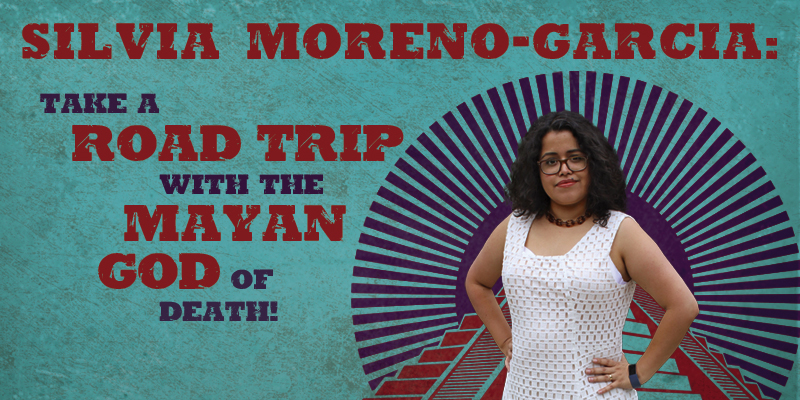Silvia Moreno-Garcia: Take a Road Trip with the Mayan God of Death!

Silvia Moreno-Garcia was born April 25, 1981 in Baja California, Mexico, and grew up in various places throughout the country. She attended Endicott College in Massachusetts, where she studied communications, then returned to Mexico, where she married her husband; they immigrated to Canada 15 years ago, and have two children. She studied journalism in Canada and recently earned a Master’s in science and technology studies. She now works in communications at the University of British Columbia.
Moreno-Garcia and Paula R. Stiles launched weird fiction publisher Innsmouth Free Press in 2009. They published 15 issues of Innsmouth Magazine from 2009-14, along with numerous anthologies, including several co-edited by Moreno-Garcia & Stiles: Historical Lovecraft: Tales of Horror Through Time (2011), Candle in the Attic Window (2011), Future Lovecraft (2011), World Fantasy Award winner She Walks in Shadows (2015; as Cthulhu’s Daughters: Stories of Lovecraftian Horror, 2016), and Sword & Mythos (2014). She also co-edited Fungi (2012) with Orrin Grey. Her anthologies from other publishers include Dead North: Canadian Zombie Fiction (2013), Fractured: Tales of the Canadian Post-Apocalypse (2014), and Nebula Awards Showcase 2019 (2019). She became co-editor of The Dark in 2016.
Moreno began publishing short fiction in 2016, and her work has appeared in Shimmer, Nightmare, Fantasy, and other magazines, plus various anthologies. Some of her stories have been collected in This Strange Way of Dying (2013) and novella Prime Meridian appeared in 2017.
Her debut novel Signal to Noise (2015) was a finalist for Aurora, Sunburst, and British Fantasy Awards, and won a Copper Cylinder Award. Other novels include Certain Dark Things (2016) and The Beautiful Ones (2017). Her latest book is historical fantasy Gods of Jade and Shadow (2019). Mexican Gothic is forthcoming. She also writes crime fiction.
Excerpts from the interview:
“My mother liked fantasy and science fiction. She had a lot of books in translation in Spanish – all the classics, Dune and Tolkien and all that – but she also had the people who were emerging in the ’70s: Tanith Lee, Anne McCaffrey, and others. In Mexico many of us learn English from kindergarten, so I was also reading in English. There were some books that were not translated and I wanted to read them. At the same time, I was also reading non-Anglo stuff. I don’t know how it was in the US or Canada, but we didn’t have literature for children when I was growing up. Children’s books were things like The Count of Monte Cristo. At eight or ten I was reading The Three Musketeers, Twenty Thousand Leagues Under the Sea – those kind of adventure novels were the only things like children’s books. Maybe we read The Wizard of Oz. In Spanish, if you wanted to read kids’ books, that was it – you read The Three Musketeers at the age of eight. The good thing about that is you acquire a good vocabulary and you learn to read widely. My family was an anomaly. A lot of people don’t read in Mexico very much, especially in our social class, but my parents were journalists, so the only thing we had at home when we were poor was books. That’s what they spent their money on. That’s also a good thing about old books – they’re cheap.
“I started writing fiction because I needed money and I was depressed. I wrote ‘King of Sand and Stormy Seas’ and ended up selling it to Shimmer, and that was one of the first stories I sold. After that I realized I could sell – that I had maybe a marketable skill. We had immigrated to Canada, my husband was working two jobs, and I had a baby and couldn’t get full-time work. I was doing journalism for this little weekly rag, writing stories for like $40 a pop. Sometimes they wouldn’t pay with cash – they would pay with food coupons to a bar where I would take my baby and eat. My mother was sending money from Mexico, which was very shameful. You move to another country to make a better life, and then your mother sends you 100 bucks so you can cover the rent. We were burning through our savings, so I was in a lousy place. When I sold that story, I thought: I can do it. The good thing about commercial speculative fiction, as opposed to literary fiction, is that markets tend to reply fast and they tend to pay. They may not pay much, but at the time getting $20 or $30 was big, and I could write with a baby on my lap. I was doing freelance journalism anyway, so fiction was one more thing I could do, and then at least I wouldn’t feel like such a horrible, piece-of-shit loser. You graduate magna cum laude and everybody says you’re going to be great – I’d gone to the States with a scholarship, I was supposed to be this smart person – and then you live in a horrible place and you’ve got no money. I was hanging out with a baby all day and wondering what happened. My friends were doing great things, and I was like, ‘How did I end up here?’
“Writing stories made me feel better, because somebody appreciated what I was doing, and it brought in this trickle of cash. Then I got a job – a horrible full-time job. I was working in video production, and it was terrible, minimum wage, and soul-destroying. I got a better job, doing communications in an office, and things were economically stable, but I kept doing the short story thing, because I had gotten used to it. I could crank them out. When you’re a journalist, there’s a deadline. A lot of times writers talk about, ‘Oh, writer’s block,’ and I’m like, ‘That’s bananas.’ If you’re a journalist and it’s 5 p.m. and you don’t have your copy done, you’re fired. I come from that mentality. Even with a full-time job, if I had an hour in a day, I could crank a story out in a couple of weeks. It’s just a process. It’s not magic. I had a friend who was studying creative writing, and she was writing one story a year. When she was done with her degree she had two or three stories, like 5,000 words each. That’s ridiculous. You need to exercise your writing muscles. The only way to get better is to write.
“I didn’t have all the inhibitions about writing and submitting that a lot of people have, because I needed to make a better life for my family, and writing was the only thing I could do. I can’t do other things. I have no other marketable skills, and I wasn’t going back to get another degree. You can’t go to school if you don’t have money. You use what you got to get out of the hole.
“When my friend Paula Stiles was living in Vancouver, we started talking about gaps we saw in the publishing market. We both liked weird fiction and the work of H.P. Lovecraft, but all the anthologies I saw had nothing but men in the table of contents – and no people of color. We kept finding, in forums online, women talking about Lovecraft and weird fiction. There were all these women who were fans of the stuff, and some of them wanted to write it or were already writing it, but we were not seeing it published. There were a lot of fan efforts, and interest from artists and illustrators, and people who did crafts – they were all interested in this Lovecraft and weird fiction nexus, with all this energy, but it wasn’t going anywhere. We thought, ‘Maybe we need to create a place for it.’ That’s how we created Innsmouth Free Press. Initially we had a magazine and a little website, but that was too much, so we whittled it down. We did several anthologies and books, which culminated in the all-women Lovecraft anthology She Walks in Shadows a few years ago, and it ended up winning the World Fantasy Award. It was an interesting experience – it was like the women men don’t see, and therefore nobody sees.
“I’ve gotten busy, but I’m going to crowdfund the translation of a novella from Spanish to English by Mexican writer José Luis Zárate, who has never been translated. He’s a literary writer who wrote an interesting take on Dracula in the 1990s. Some people in Mexico heard about it at the time, but it went underground and he’s become a cult writer. I bought the rights to the novella. I’ve got a translator working on it, so I’m going to release it with Innsmouth Free Press eventually next year. He’s very different from the magic realists. His book will show a different side of Mexican authors that most people never get to see, because they’re not translated, or they’re not marketable like Allende and writers like that are. This is a guy who wrote something in the style of an 1800s diary of a sea captain in Dracula, so it doesn’t read like what we expect of Latin American fiction. That’s why I like it. He was also one of the last writers of a mini speculative fiction boom that ended in the 1980s and early 1990s, and there hasn’t been anything like that since. He’s like the swan song of this tiny moment when there was a hope that there might be commercial fantasy and science fiction literature in Mexico, and then it didn’t happen.
“My first collection was This Strange Way of Dying. I got that one because I won an award for a story, sponsored by Gloria Vanderbilt, from Exile Magazine. I found a copy at a library or something, and it was just the name ‘Exile’ that appealed – because I was an exile, a self-exile. I read it and one day it announced something like, ‘Contest, $3,000 prize.’ I said to my husband, ‘I’m going to make us $3,000.’ My story ‘Scales as Pale as Moonlight’ won, they flew me in to get the award and the check, and I met Gloria Vanderbilt.”
Interview design by Stephen H. Segal. Photo by Arley Sorg.
Read the full interview in the September 2019 issue of Locus.
 While you are here, please take a moment to support Locus with a one-time or recurring donation. We rely on reader donations to keep the magazine and site going, and would like to keep the site paywall free, but WE NEED YOUR FINANCIAL SUPPORT to continue quality coverage of the science fiction and fantasy field.
While you are here, please take a moment to support Locus with a one-time or recurring donation. We rely on reader donations to keep the magazine and site going, and would like to keep the site paywall free, but WE NEED YOUR FINANCIAL SUPPORT to continue quality coverage of the science fiction and fantasy field.







